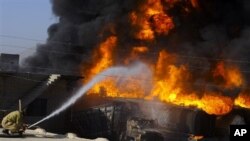Police in Pakistan say a group of unknown gunmen have killed one person and set fire to at least 25 trucks carrying fuel to NATO forces stationed in neighboring Afghanistan. Taliban militants are reported to have claimed responsibility for the sixth attack this month on NATO convoys.
The pre-dawn assault targeted a terminal for NATO convoys on the outskirts of the Pakistani city of Quetta, just more than 100 kilometers from the Afghan border.
Provincial police chief Malik Mohammad Iqbal gave details of the attack to reporters. He says gunmen in two cars entered the terminal where NATO oil tankers were parked for the night stay. The attackers, he says, were indiscriminately firing and killed one person and forced others to flee.
Witnesses say the gunmen then torched the fuel trucks and escaped the scene. Firefighters struggled for many hours before they finally put out the flames. Authorities say the fire spread from vehicle to vehicle and destroyed 25 trucks, while others were moved out safely.
This was the sixth attack on convoys carrying supplies to NATO and U.S troops in neighboring Afghanistan.
While the convoys are able to move freely across the southwestern Pakistani border town of Chaman, the key border crossing in northwestern Pakistan remained closed for a seventh day.
The Pakistani government shut the Torkhum border crossing in the historic Khyber Pass after repeated cross-border raids by NATO helicopters. One of the raids struck a Pakistani border post, killing three soldiers.
U.S. officials say the Torkhum border crossing is an import route and they are working with Pakistani authorities to reopen it as soon as possible.
Critics say a lack of coordination between Pakistan and the U.S.-led international forces on the other side of the border is to be blamed for the tensions. Khalid Aziz, a former top administrator in the northwestern Pakistani province through which most of the NATO convoys travel, says Pakistan and coalition forces need to resolve the issue quickly to prevent more attacks on NATO convoys.
"Pakistan and the United States are both allies in this war," Aziz said. "And I think the need is to be dealing with the situation with depth and maturity, it can not be dealt with emotionally. I think in this case there was a lack of consultation, which has created this crisis."
Supplies such as food, military vehicles and fuel for U.S.-led foreign troops in Afghanistan land at the southern Pakistani port city of Karachi. The goods are then taken on trucks to Afghanistan through the Torkhum border crossing.
But the week-long border closure has forced hundreds of NATO convoys to be parked at various locations along the main highway leading to the northwestern border with Afghanistan.
Pakistani Taliban militants have claimed responsibility for attacks on NATO convoys and have threatened to carry out more such raids unless Islamabad permanently halts the supplies.
At Least 20 NATO Tankers Attacked in Pakistan




